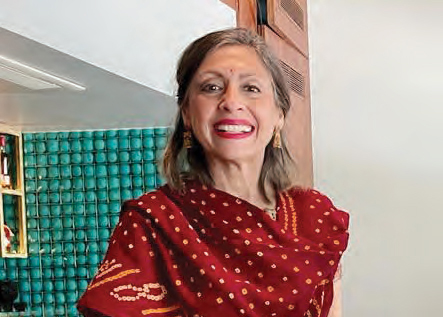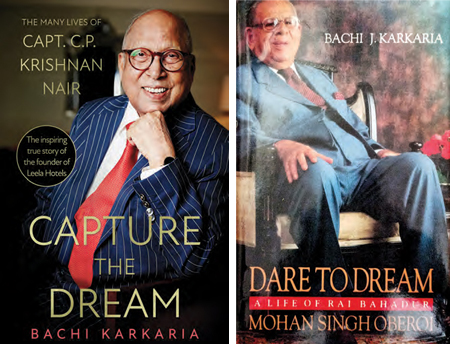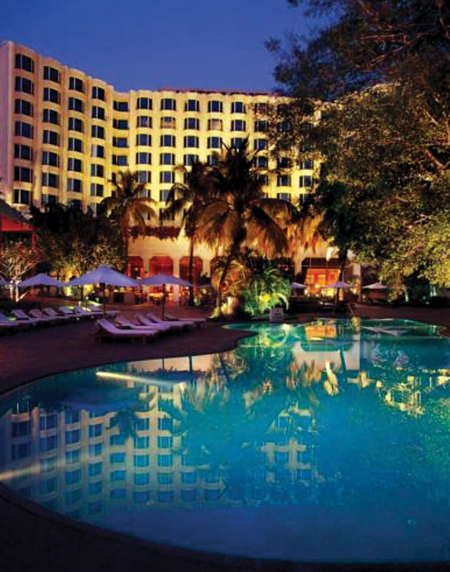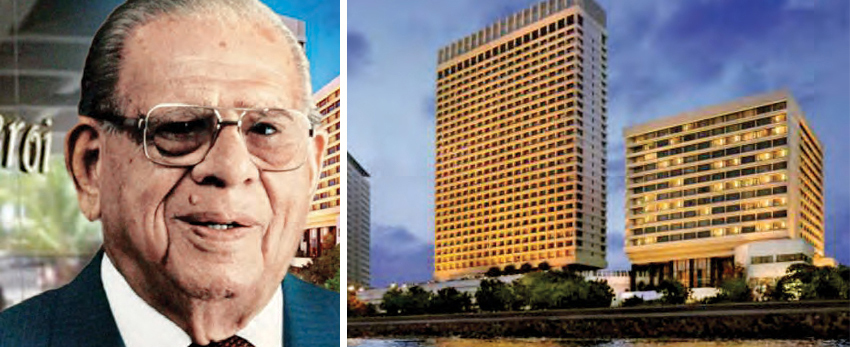Men of Audacity-not just Tenacity

Celebrating author, journalist and columnist Bachi Karkaria’s books, this Avid Learning session titled ‘Capture the Dream: Business Leaders with Audacity, not just Tenacity’, presents a special discussion focussing on the history of businesses and how they are built by strong leaders. The discussion with Karkaria and Manjeet Kripalani, co-founder and Executive Director, Gateway House, draws from the former’s books, ‘Dare to Dream: The Life of M S Oberoi’, and ‘Capture The Dream: The Many Lives of Captain C.P. Krishnan Nair’, to trace the journeys of these extraordinary business leaders and how they created a new class of entrepreneurship and paved the way to 21st Century India
"When it comes to business, business stories have the power to inspire, motivate, awaken the dreamer and adventures within, and give us the foresight to see possibilities beyond the page"
-Asad Laljee,
SVP, Essar Group and CEO of Avid Learning
"Today, India is being talked about and the world is taking note of it, but the point is these two gentlemen (Mohan Singh Oberoi and Captain C.P. Krishnan Nair) made their way when India did not have the wherewithal, or the political backing, or ‘India Shining’ as a motto, and yet no one did more than these two gentlemen to project this image"
-Bachi Karkaria
"There is nothing in the world like Indian businessmen because they know how to adapt. They know how to overcome hurdles. Therefore, they tend to be very successful"
-Manjeet Kripalani
Looking into businesses as human ventures with human stories and attributes, this session explores the extraordinary journeys of leaders who had the courage and determination to step into the unknown with agility and the ability to innovate and succeed with limited resources. The attempt is to decipher the untold stories of the inspiring lives of people who are game-changers of India Inc.
Asad Laljee, SVP, Essar Group and CEO of Avid Learning, teed off the session by saying, “I’ve always believed in the power of narratives and personal stories. They often tend to engage our curiosity, emotions and imagination. When it comes to business, business stories have the power to inspire, motivate, awaken the dreamer and adventures within, and give us the foresight to see possibilities beyond the page. Today’s session aims to unravel some untold stories, stories from business mavericks who have defied challenges and developed successful businesses with resilience and innovation, among the toughest odds.”
"Oberoi was the first to introduce room service when he managed to get the Associated Hotels of India, which was the biggest chain on the subcontinent-and with that, all these fabulous hotels in Calcutta, Shimla, Murree, Rawalpindi, Lahore, fell into his hands"
Excerpts from the session...
Manjeet Kripalani: There is nothing in the world like Indian businessmen because they know how to adapt. They know how to overcome hurdles. Therefore, they tend to be very successful but their success is not feted as it should be. It’s a great thing that your books record these great people who are an inspiration to other generations.
Our Minister of External Affairs, S Jaishankar said recently that India at 75 years of its Independence, is at a juncture where it should put behind the idea that it needs to get approval from other quarters; we have to be confident about who we are. It’s better to engage with the world on the basis of who we are, rather than try and please the world by being a pale imitation of what they are. What could be more appropriate than a description of these two fine gentlemen who you have described in two of your books-Captain Nair and Rai Bahadur Mohan Singh Oberoi. They defined themselves and they defined what India was, and that was their mission.

Bachi Karkaria: Today, India is being talked about and the world is taking note of it, but the point is these two gentlemen made their way when India did not have the wherewithal, or the political backing, or ‘India Shining’ as a motto, and yet no one did more than these two gentlemen to project this image. Mohan Singh Oberoi when he started before independence, India had this begging bowl image. And here was this man who came from an obscure town in Punjab and he gave the world a new definition of luxury. The same with Captain C P Krishnan Nair; he was born in this tiny hamlet of Kannur district, and he again, re-defined luxury, which had already been defined by hoteliers who had become the aristocrats of the hotel industry: the Taj and the Oberoi.
It was a degree of chutzpah that made them what they were. They took the help of foreign chains but when they thought that they were getting too big for their boots, they showed them the door. Mr Oberoi had a tie-up with Sheraton because it was the time of US aid and P.L.480. But when Sheraton didn’t allow him to sell the shares that he wanted, he said that if he couldn’t run his business his way, they had better leave-and he showed them the door.
When Capt. Nair created this idyllic paradise of 75 acres in Goa, he told Kempinski who was tied up with them that he needed to bring in the $500 per night tourist who goes to Bali, Sri Lanka or Thailand. He then looked for a global chain that would show him the way to do it. So, he got in Isadore Sharp and Four Seasons. But then Four Seasons called the shots, asked for the rooms to be broken down into suites, add more details to the Hampi empire lobby, and he did all that. He had to keep his hotel shut for two years, while he brought in all these changes. And then six months before the opening, the great team of 14 expatriates including the GM, came in with very fancy salaries and started to show how a truly global hotel should run. He was eager to learn, he had his daughter-in-law Madhu who was not into the business picked up the tricks of the trade. Then two things happened-Capt. Nair wanted co-branding. You must remember that far more than MS Oberoi, Capt. Nair was a very egotistic man-maybe you need that to get ahead and be in this high profile industry.

Equally rightly, Four Seasons refused as it could lead to all their other partners demanding the same and it was not their standard operating procedure. That, by itself, would have been the deal-breaker but something worse happened and it involved egos, which is the non-negotiable thing. Capt. Nair and his wife wanted to come and spend the weekend and when his secretary called, she was told that she would have to check this with the General Manager. Capt. Nair was furious; he called his son and told him to send them packing. And the son literally did just that and they took the next flight home. The fact of Capt. Nair bringing in Four Seasons brought in a very important change in the whole hotel industry. Earlier, foreign chains could only come in as management contracts, franchisees, and booking. They came in on a commission, but they had to take 26% equity. Four Seasons wanted operator status. Capt. Nair’s son, Vivek, who was a senior office-bearer of the Federation of Hotels and Restaurants Association of India, lobbied with the government and managed to get this. The irony really is that the several concessions that Vivek got for the industry, just didn’t work out for them.
"Captain C P Krishnan Nair was born in this tiny hamlet of Kannur district, and he again, re-defined luxury, which had already been defined by hoteliers who had become the aristocrats of the hotel industry: the Taj and the Oberoi"
These gentlemen built their empires, their brands, and India. Internally, they had a philosophy about what they had to do. The Oberoi philosophy was the room is the centre of your business and profit while the philosophy of Capt. Nair was that the employee is your first customer.

Oberoi was the first to introduce room service when he managed to get the Associated Hotels of India, which was the biggest chain on the subcontinent-and with that, all these fabulous hotels in Calcutta, Shimla, Murree, Rawalpindi, Lahore, fell into his hands. He brought in room service because it, first of all, cleared the corridors of the retinue that guests travelled with, and stopped their interference in the kitchen. He built this ingenious system of food lifts which came up, and he was also the first to employ housemaids or housekeepers-one even ended up being his mistress, and she managed the hotel very well.
All the founders, the pioneers, were very well connected with their staff. They knew their names, and the illnesses their wives were suffering from, and they were always there to give a helping hand to them. In Capt. Nair’s book, we have a chapter which says ‘A Heart for All Seasons’ about the things he did for the people. Very important is the fact that when the sale of the Leela was happening, the grapevine was buzzing and naturally the staff was getting agitated. The head-hunters were out to scalp the best talent. So, they had to not just island their guests from what was happening but they also had to island their staff. They reinforced two things which were always part of them self-belief and esprit de corps. They worked on this Harvard study which says that productivity increases by a third when there is a higher cause. Here, the higher cause was that we are all in it together. They would constantly be holding their hands, they would have the equivalent of a town hall meeting, their salaries were paid on time, and they were encouraged to come and say whatever they felt. And it worked because they didn’t lose anyone important. And even as this crisis was happening, they kept winning all these awards, like Udaipur winning Best Hotel in the World. It was a very institutionalised perfection that had been done. Like JRD Tata said, ‘Strive for excellence and perfection will follow’.
"With Oberoi, it was think really grand but don’t forget about the price of the potatoes. In the early years, it was a struggle when they took over Clark’s hotel in Shimla. He had to borrow from his mother’s friends"
What did these two men have in common-what were their characteristics and similarities in their backgrounds?

Today’s philosophy is to stay hungry; and they were really, really hungry. Neither of them was born with a silver spoon or even a metal spoon. The overriding commonality between them is a really huge ambition. It’s again Browning’s line which says, ‘Ah, but a man’s reach must extend his grasp, Or what’s a heaven for?’ These two really lived that. They had the ability to think big but at the same time not forget the small. With Oberoi, it was think really grand but don’t forget about the price of the potatoes. In the early years, it was a struggle when they took over Clark’s hotel in Shimla. He had to borrow from his mother’s friends.
Both also had very strong mothers...
Both these gentlemen did have very strong mothers. They were simple women who didn’t come with management degrees or from landed families but they knew the power of the network. As we know, a network enhances net worth. The misfortune of Mohan Singh’s father’s death and his mother returning to her parental home got him connected with the landed gentry of Punjab as his maternal grandfather was a money-lender who was connected with all the fiefdoms there. When he needed funds to buy hotels, he relied on them.
Capt. Nair’s mother Madhavi amma knew that she had to give her boy an education so she found the local biggie to get her son into school. She managed to get him into the next secondary school, again persuading people. Capt. Nair’s biggest mentor or door-opener in his early years was V P Menon. Now Menon’s second wife was from Kannur. Madhavi amma said to her that her boy, who was a wireless officer in the army at the time in Delhi, was homesick, so would she please take him this jar of prawn pickle? That humble jar of pickle got Nair into the ambit of V P Menon. It was the start of all kinds of advantages for him.
Both were also sons of the soil, connected to their home villages, which made them understand India and Indians...

Even at 90, MS Oberoi would still talk about his mother’s mathri, and her lime pickle which could last for 20 years with no problem. He was also very dedicated to his wife, even though he did have a series of mistresses, some very close ones. Leela Nair was not the power behind Capt. Nair’s throne-she was the throne. She influenced every decision of his, every new career that he took on.
Capt. Nair - a born entrepreneur?
The Malayalis are born entrepreneurs. He was very good at sensing an opportunity, for instance, the whole textile trade. They actually belonged to a low caste-the Vaniyars. His father was a glorified peon in the Revenue Machinery, his mother sold copra for a living and yet this boy found opportunity and grabbed it by the forelock. You can’t sit there waiting for an opportunity to knock-you have to find it and drag it in. It’s pure chance that both these books have ‘dream’ in the title. It really is this ability to dream and then capture that dream and work towards it. For Oberoi, it was really daring to dream and for Capt. Nair, it was about capturing the dream, despite the very humble circumstances of their birth.